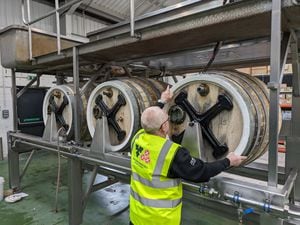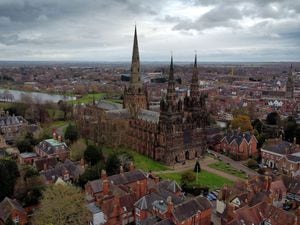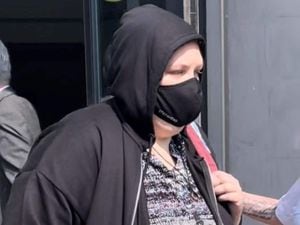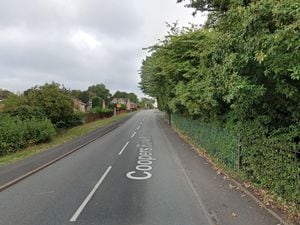Wife's quick thinking saved stroke victim's life
Owain Wyn-Jones's girlfriend Laraine asked him to raise his arms, but he couldn't manage it.
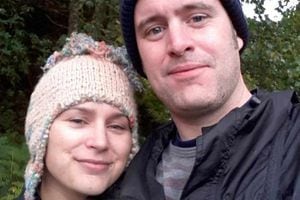
"I could not only not do this, but I did not know where my left arm was," he recalls.
"It was obscured by a cushion and my brain could not work out where it was. I couldn't move it. My face was visibly drooping on the left hand side and my speech was slurred."
Like many men, Owain's first reaction was to play the whole thing down. But a few days earlier, Laraine had seen a public information film about spotting the early signs of a stroke. And he believes her quick-thinking probably saved his life.
"When I woke up and started acting oddly she realised straight away what was wrong," he says.
"I was only 30 at the time, so I'm living proof that strokes don't just affect older people. When it was happening, I thought I was just having a funny turn, if it had not been for Laraine and the TV adverts I dread to think what might have happened."
"The sooner somebody who is having a stroke gets urgent medical attention, the better their chances of a good recovery," says the Stroke Association.
Laraine knew what to do when Owain was taken ill because she had seen a public information broadcast about the "Fast" campaign which helps people to recognise the symptoms of a stroke.
The Stroke Association is calling for people across Shropshire to support the Fast Forward campaign by learning the signs of a stroke and sharing the message to help save more lives.
It urges people to use four simple steps to decide whether somebody is need or emergency help:
Face has their face fallen to one side? Can they smile?
Arms can they raise both arms, and keep them there?
Speech is their speech slurred?
Time if the patient demonstrates any one of these signs, it is time to dial 999.
Elaine Roberts, Director of Life After Stroke Services for the Stroke Association in the region, said: "When it comes to stroke, time lost is brain lost. A stroke is caused by a blockage or a bleed in the brain, which cuts off the brain's flow of oxygen and causes brain cells to die. So recognising the symptoms of stroke and calling 999 for an ambulance as quickly as possible is absolutely vital. Acting FAST can help reduce the devastating impact a stroke can have
She said a survey found that 14 per cent of people in the West Midlands wrongly believed a stroke could never happen to them.
Owain describes the fateful morning in 2009 with a wonderful sense of understatement.
"Laraine and I were staying with friends in Woodseaves, Staffordshire, and I woke in the morning not feeling 100 per cent," says the 36-year-old from Shifnal. "I felt groggy and uncoordinated and struggled to get washed and dressed."
The friends he was staying with gave him a cup of coffee and a bacon roll, but his condition showed no sign of improvement.
"I really struggled to chew and swallow, I also was finding it hard to string together coherent sentences, everything seemed like hard work.
"I said I was fine and just needed to sleep."
The advertisement Laraine was part of the "Fast" campaign, which urges people to carry out a series of simple tests if they suspect somebody has had a stroke.
"She immediately realised something was not right. Fortunately she ignored me and consulted with the friends we were staying with – they also thought I looked ill.
"I was exhibiting all the symptoms. Although I was protesting and saying 'I'm fine, there's no need to make a fuss', she phoned NHS Direct and they confirmed the symptoms."
Paramedics arrived quickly on the scene, and he was taken to North Staffordshire Hospital in Stoke-on-Trent, where his worst fears were confirmed.
"I had a blood clot in my brain and they recommended that I receive a treatment called thrombolysis which involves administering a 'clot busting' drug to break down the blood clot," he says.
"It comes with risks, but I was in a bad way and was happy to take the chance. I was given the drug intravenously and within quite a short period of time, about 30 minutes, I started to notice I could now wiggle my fingers and toes – it was beginning to work.
"Over the next week I slowly regained movement and started to feel tired and they allowed me to start walking. I was released from hospital shortly afterwards to begin my recovery at home."
The recovery was long and difficult, but more than five years on, Owain describes himself as 95 per cent recovered.
"It was tough in the short term. I was struggling with lethargy, confusion, memory loss and felt very, very low," he says.
"I was told to expect this and that things would improve, it took time. With the support of Laraine and my family I began to improvements over the next few months and I started to get involved with stroke charities in a voluntary capacity, this helped me feel normal and as if I was getting back to work."
Before he was taken ill, Owain had his own business in marketing and advertising, but the stroke left him with little choice but to sell up.
"I was in no fit condition to work and I had been told in no uncertain terms that I would not be working for six-to-12 months.
"Whilst my recovery was slow I felt very lucky to be alive, one in three people that suffer a stroke die."
Finding work proved to be difficult.
"I was deemed a 'risky proposition' by many employers due to my history of ill health. I took matters into my own hands and started grafting for an agency to prove to everyone – and myself – that I was fit for work.
"Over time I proved my point and started to attract professional employment opportunities in the marketing sector. I now provide freelance marketing support services to small and medium-sized enterprises and I'm currently on a three-month contract supporting creative businesses on the Isle of Eigg in the Hebrides."
Owain says his brush with death has changed his life in many ways, and some of them have been for the better.
"Since my stroke I have opened my eyes to work opportunities I would never have considered before. I earn less but I enjoy every minute of my work and life.
"I do have memory and concentration issues but I have learnt to cope with them and I have not allowed them to hold me back. I am physically fitter than at any time in my life and I enjoy an active outdoor life.
"My stroke was not all bad, it made me appreciate that life is too short to have regrets."
And most importantly of all, he will never forget the debt he owes to Laraine, who he married less than a year after being struck by illness.
"I proposed to her seven days after leaving hospital and we were married 10 months later," he says,.
"We've now been married five years."

